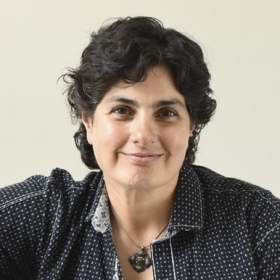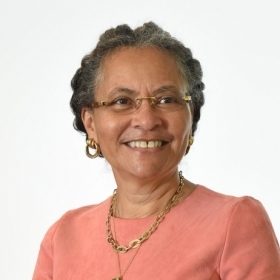What’s here that we’re not seeing?
That’s a question I ask myself a lot, on all kinds of levels, literal and metaphorical. What have I missed? Are there realities here that are hidden by outward appearances? How can I look more deeply?
I got to pondering this question the other day on one of my lunchtime meanderings on campus. I had been down near Tupelo Point—the lake had its first skim of ice—and was on my way up the path back toward Severance Green, just below Founders. I happened to look up to the tops of some very old oaks, now naked of their leaves. Way up there, bending in the breeze, was a nest. I’m not talking about one of those cozy abodes that, say, cardinals build, the kind that might fit in the palm of your hand. This was a true mansion—an impressive weave of twigs and other materials. Somebody large had grown up there.
I looked up again, and suddenly saw nests everywhere—large and small—in the trees along the path and up the edge of the green. They overlook the spot where the vast commencement tent has stood for the last few years, and I amused myself by imagining mother birds peering down on the graduates and leaning over to nudge their reluctant fledglings. “Look, they’re leaving,” they’d say. “You should, too.”
The point is, there’s a whole community up there in the springtime, lives that go on almost totally unseen to those of us who walk by every day on the ground. What’s here that we’re not seeing?
This magazine is full of people who are leaders because they’ve been able to see things others have missed. Probably the most extreme case is astrophysicist Nergis Mavalvala ’90, who helped create the scientific equipment that detected the existence of gravitational waves, thereby confirming Einstein’s Theory of Relativity (“A Cosmic Breakthrough”). But equally important is Camara Jones ’76, a physician and public-health specialist who has spent her career helping other people see that racism adversely affects the health of Americans (“Diagnosing Racism”). Nergis and Camara were the 2018 recipients of the Alumnae Achievement Award, Wellesley’s highest honor.
And then there’s Liz Miranda ’02, one of the alumnae featured in “Wellesley Runs,” which explores why two political novices ran for office. Liz, a first-generation Cape Verdean American, came to Wellesley from Boston’s Roxbury neighborhood and found the transition profoundly difficult. “It was so uncomfortable, and so different and so challenging,” she says, “that I think you cannot leave there regular. You can’t leave there without a deep sense of ‘This is what I’m meant to do in the world.’”
What Liz found she was meant to do was become a community and youth organizer in her neighborhood. What she saw, where others may not have, was opportunity—opportunity to help where people were struggling, and to help others see, too. Last year, for example, she raised funds to take 2,700 young people to see Black Panther. “This film was an important way to show the empowerment and the rich legacy of African people throughout the world,” she told an interviewer last year. “It was important for me to show young people that they are superheroes, too, and that they are scientists, and they can make a difference in their world, too.” She went on to launch a political campaign and now represents the fifth Suffolk District in the Massachusetts House of Representatives.
So take a look up. You may start to see nests everywhere. What’s here that we’re not seeing?







